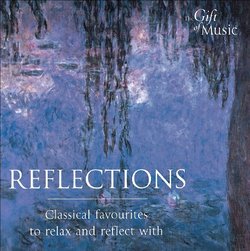| All Artists: Various Title: Reflections Members Wishing: 0 Total Copies: 0 Label: The Gift of Music Original Release Date: 1/1/2002 Re-Release Date: 3/1/2003 Genre: Classical Styles: Chamber Music, Forms & Genres, Concertos, Sonatas, Symphonies Number of Discs: 1 SwapaCD Credits: 1 UPC: 658592103625 |
Search - Various :: Reflections
 | Various Reflections Genre: Classical
Reflections Classical favourites to relax and reflect with. Music is a powerful and mysterious art. With the simplest of means it is able to conjure up a mood, emotion or atmosphere and instantly draw the listener in. Cent... more » |
Larger Image |
CD Details
Synopsis
Product Description
Reflections Classical favourites to relax and reflect with. Music is a powerful and mysterious art. With the simplest of means it is able to conjure up a mood, emotion or atmosphere and instantly draw the listener in. Centuries ago the wealthy paid a fortune to composers and performers to provide them with music to raise their spirits or simply help them relax. Now everyone can enjoy these benefits. This collection has been specially selected from the most restful music of the past 300 years to help us relax. Adagios, Largos and Andante - composers of the past poured out their deepest thoughts in these slow movements of this orchestral, chamber and piano album. It is one of the longest established traditions of classical music that composers reserve their most reflective thoughts for the middle movements of their works. After a stirring opening movement and before the final rousing finale, generations of composers have poured out their most profound ideas in slow movements which might be entitled 'Largo', 'Adagio' or 'Andante'. On this album are some of the most memorable of these masterpieces. Sometimes serene, sometimes wistful, sometimes passionate, they are always reflective - each one a window onto the soul of its creator. Elegance and poise are features of Johann Sebastian Bach's slow movements. The adagio from the Double Concerto is no exception. Long, intertwined melodies from the two solo violins cross and re-cross in music of sublime beauty, supported by a gentle orchestral accompaniment. This movement dates from the early eighteenth century, while the second piece on the album, a work by Mozart, is several decades younger. This famous andante reached new twentieth century fame when it was used in the film Elvira Madigan. The music of the piano soloist is poised, poignant and beautiful, the orchestra restrained and careful in its accompaniment. More piano music follows. Beethoven's solo piano music ranges from tempestuous to sublime, even within a single sonata such as the Pathétique. The Adagio cantabile is its most famous movement, with a strong, singing melody. Schubert's Musical Moments are a refined and delicate set of pieces. No. 2 is at once gentle and serene. Even its central moment of anger is but a brief interruption to the endless ebb and flow of the melody. The Andante from the 'Trout' Quintet is similarly slow and reflective, as are the two evocative piano pieces by Schumann which follow. Birds and flowers are two strongly inspirational themes which many composers choose for music of poetry and beauty. The final three tracks feature the violin, as soloist or as the predominant sound of the symphony orchestra. The Violin Concerto No. 1 of Max Bruch has been a firm favourite for the classical repertoire for many years. The Adagio is, of course, exquisite. Tchaikovsky's Pathétique is a work of tragedy, except for its serene Adagio, while Mendelssohn's concerto distils the essence of Bach and Mozart into a sublime work of originality and profundity which is as loved today as it was during the heyday of its composer, the early-Romantic period.

 Track Listings (10) - Disc #1
Track Listings (10) - Disc #1